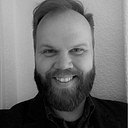Mitchell,
You've brought up Jordan Peterson before; I'm not sure if you're familiar with his idea that there are two "worlds" that humans operate in - the world of actions, and the world of things.
This distinction isn't really Peterson-esque at all. It shows up in psychology at different times and in different ways; objective vs. subjective, for example. Trivial things like self esteem (what I feel about myself as an object of evaluation with properties) vs. self-efficacy (what I feel about myself as an actor with capabilities). You could even argue that the two are reflections of the two halves of the sensorimotor cortex--the part that perceives and the part that acts.
The two follow entirely different sets of rules. If the aim of one is to perceive accurately the aim of the second is to act wholeheartedly. Once people get to the 'act' phase - as individuals or as a collective - they'll willfully misconstrue whatever they need to in order to act wholeheartedly, even if that act is "back down and focus on my thing while trusting the big guys to do theirs."
Not sure if that adds anything to the conversation, really; I'm just echoing what you and I already know, which is that people will happily decieve themselves if doing so allows them to go along with their plans. But it's such a universal tendency, appearing so often, across all levels of society, in all places, that I have spent a long time wondering about the reasons behind it. The above is the best that I can come up with - and I am certain it is a flawed account.
Hopefully some day we’ll have a better one, and hopefully some day we’ll have enough insight to figure out how to counteract the self-deception more effectively than we can now.
J
